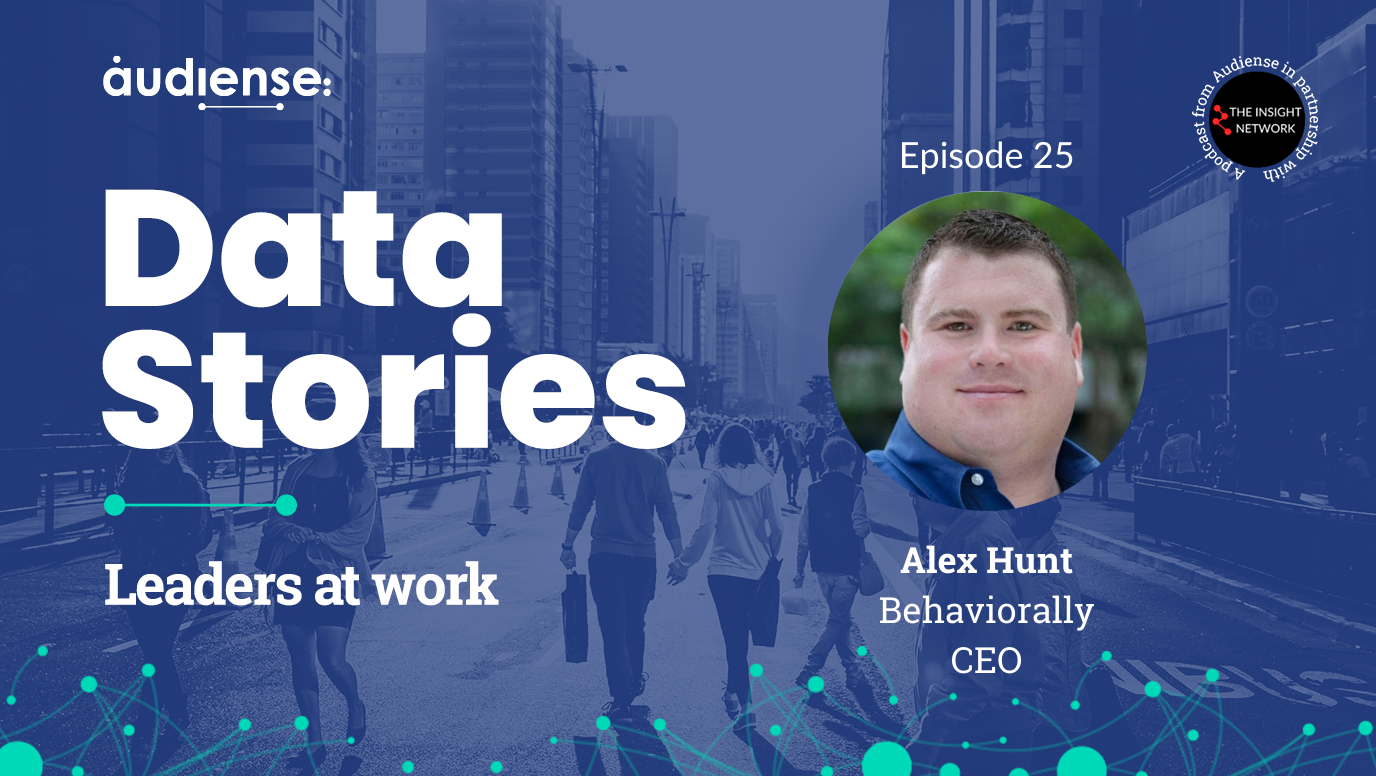[PODCAST] Recognizing that you’re only as good as the team around you
Data Stories: Leaders at Work is a weekly podcast brought to you by Audiense. Hosted by Rahul Jerome, founder of insight-intelligence.com, the series captures personal anecdotes and career highlights from some of the most talented and brightest minds in the research and insights industry.
On this episode of the Data Stories: Leaders at Work podcast, I sit down with Alex Hunt, CEO of Behaviorally. Alex was instrumental in the growth and global expansion of BrainJuicer (now System1 Research). During our conversation, Alex shares a swath of meaningful takeaways from his time in the research and insights industry.
Alex starts off by revealing that he got into insights by mistake, more or less. Initially intending to go to law school after completing a degree in political science, Alex found his desire to continue his studies waning. After seeing an advert for a graduate training program, Alex interviewed for two days and landed a position with an insights firm after promising that he would come with knowledge about the company.
Leaning into the discomfort of not knowing what to do next
It seems as though people with an interest in law tend to bring the skills necessary to really excel in the insights industry. And though he ended up going a different route than law school, Alex believes this may be because they have critical thinking skills and an ability to develop a strong argument. “I never really went back to school, really, because I enjoyed what I was learning in insights,” Alex says. What a strong candidate for an insights career should do is lean into the discomfort of not knowing what to do next.
Alex also firmly believes in the notion of being in the right place at the right time, but that’s not all. There are four “inflection” points he likes to look back on when thinking about what forces actually put him where he needed to be.
The first point was the opportunity for travel that an insights career would provide. Working and doing business in another country taught him many things he wouldn’t have otherwise learned, and sharpened
Survival skills for startups
The second big inflection point was after he left Kantara to help build out a smaller startup at BrainJuicer. It was the moment, Alex says, that he really learned what it meant to be an entrepreneur. While being mentored under BrainJuicer’s founder, he was taught that “you only get somewhere if you make things happen,” speaking to the survival skills that startups really need if they want to succeed.
Later on, when BrainJuicer became System1, Alex shares that growth was slow and it shook him as a leader. He shares that it’s really only when a business is struggling that a leader can be tested and grown into a strong business spirit. Now at Behaviorally, Alex is deep into his insights career, and he helps clients grow their digital shopper base.
Alex also explains the importance of finding mentors at every stage of your career so you can continue to grow. “Resistance is futile,” he jokes.
Key personality points for a successful CEO
When asked about the key personality points a CEO needs to be successful, Alex shares the following:
- The ability to communicate. “You cannot communicate too much or too often.”
- Being aware and recognizing that you’re only as good as the team around you. “You cannot rely too much on your leadership team to attract talent.”
- You must also be comfortable with risk. “You need to be smart enough but not too smart--some decision is better than no decision at all.”
After having read Horowitz’s The Hard Thing About Hard Things, Alex shares a key insight he learned about the nature of mentorship, and how important it is to find mentors who have earnestly “walked in your shoes” because you need to be able to relate to their experience.
The biggest mistake that insights companies make is that they don’t listen to their clients nearly enough. And beyond that, there’s a kind of humility that insights firms need in order to be able to bring in the right talent to address pinch points.
Where does the magic of business happen?
Alex was kind enough to offer advice to a young professional eager for the C-suite. The first point is hard work. “If you’re passionate, it shouldn’t really feel like work,” he says. And putting in the work is a prerequisite for success--no matter where you are. His second point is to be willing to take risks and make mistakes, because this is where the magic of business happens, and you have to be ready for it.
Finally, Alex urges the young seeker to be kind to everyone around them. Look for opportunities to help, and grow your network through acts of service and kindness. This kind of network building will yield even greater rewards. “Network building with a generosity of spirit is essentially, really,” Alex says.
The full version of the podcast with Alex Hunt can be listened here:





